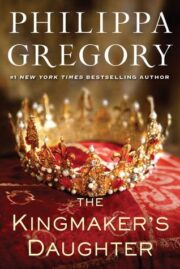And lastly, I would never love a daughter of Elizabeth Woodville. I never ever will. The woman has loomed like a baleful comet on my horizon for all my life, from the moment I first saw her, and thought her the most beautiful woman in the world at her coronation dinner, to the time that I realised that she was my inveterate enemy and the murderer of my sister and my brother-in-law. Whatever smiling means Elizabeth took, in order to get her daughters entry to our court, nothing has charmed me, nothing will ever charm me into forgetting that they are the daughters of our enemy; and – in the case of the Princess Elizabeth – they are the enemy themselves.
There is no doubt in my mind that she is here as a spy and a distraction. She is betrothed to Henry Tudor (her mother’s widely announced change of heart means nothing to me, and nothing – I suspect – to him or to her). She is the daughter of our enemy and the betrothed of our enemy. Why would I not think of her as my enemy?
And so I do.
When the snow melts off the hills of the North and we can travel home again we leave London. I am so glad to go that I have to pretend reluctance for fear of offending the London merchants and the citizens who come to court to bid farewell and the people who line the streets to cheer as we go by. I think of London as a city that loves the Rivers, and I can hear the roar of applause as the three Woodville girls ride side by side behind me. London loves a beauty and Elizabeth’s warm prettiness makes them cheer for the House of York. I smile and wave to take the compliment for myself but I know that for me there is the deference for a queen, but not the affection that a pretty princess can create.
On the road I set a brisk pace so my ladies in waiting are all left behind, so that I don’t have to hear her and her sisters chattering. Her voice, which is musical and sweet, sets my teeth on edge. I ride ahead and my guards ride behind me and I don’t have to hear her or see her.
When Richard comes back from the head of the procession he puts his horse beside mine and we ride companionably together as if she were not smiling and chattering behind us. I glance sideways at his stern profile and wonder if he is listening for her, if he will hold his horse steady and drop back to ride beside her. But then he speaks, and I realise that my jealousy is making me fearful and suspicious when I should be enjoying his company.
‘We will stay at Nottingham Castle for the month,’ he says. ‘I plan to rebuild your rooms there, make them more comfortable for you. I shall continue Edward’s building programme. And then you can go on to Middleham if you like. I will follow you. I know you will be in a hurry to see the children.’
‘It has seemed such a long time,’ I agree. ‘But I heard only today from the physician that they are all well.’ I speak of the health of all three children. We never like to admit that Teddy is as strong as a hound puppy – and with as much sense – and Margaret is never ill. Our son, our Edward, makes slow progress to manhood, small for his age, easily wearied.
‘That’s good,’ Richard says. ‘And after this summer we can bring them all to court and keep them with us. Queen Elizabeth always had her children with her, and the princess tells me that she had the happiest childhood at court.’
‘Mistress Grey,’ I correct him, smiling.
NOTTINGHAM CASTLE, MARCH 1484
I am happy as I dismount from my horse and make my way to the new queen’s apartments. I can hear my ladies in waiting chattering as they follow me, but I cannot distinguish the voices of the Rivers girls. I think, not for the first time, that I must learn not to look for them, I must work to diminish their effect on me. If I could teach myself to care nothing about them, one way or another, then I would not look to see if Richard is noticing them, or if the oldest girl, Elizabeth, is smiling at him.
We have been at Nottingham for several days, hunting in the wonderful forests, eating the venison we kill, when a messenger comes to my rooms one evening. He looks so exhausted from his ride and so grave that I know that something terrible has happened. His hand, as he holds out the letter, trembles.
‘What is it?’ I ask him, but he shakes his head as if he cannot tell me in words. I glance around and find Elizabeth looking steadily at me, and for a cold moment I think of her and her mother cursing the line of whoever killed the princes in the tower. I try to smile at her, but I can feel my lips stretch over my teeth and know that I am grimacing.


"The Kingmaker’s Daughter" отзывы
Отзывы читателей о книге "The Kingmaker’s Daughter". Читайте комментарии и мнения людей о произведении.
Понравилась книга? Поделитесь впечатлениями - оставьте Ваш отзыв и расскажите о книге "The Kingmaker’s Daughter" друзьям в соцсетях.